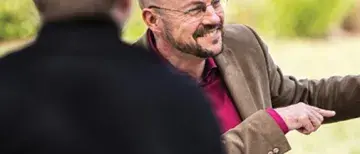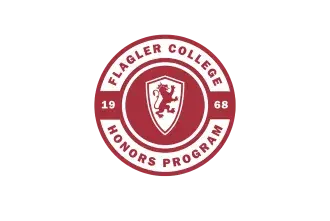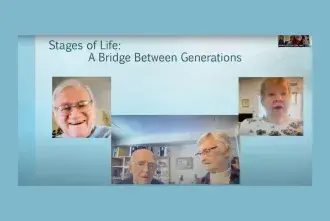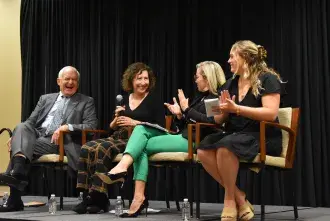
Through this curriculum, students are given the tools to develop skills like social scientific inquiry, ethical and quantitative reasoning and oral communication. The program begins with the First-Year Seminar and culminates with FlagSHIP (Flagler Sophomore High Impact Practice), a program that merges learning and interacting across communities.
But at its “core,” Doug Keaton, Flagler’s faculty director of Classical & Liberal Education and Core Curriculum and a professor of Philosophy, said the goal has been to increase student engagement, which has already become apparent.
Flagler College Magazine sat down with Keaton to learn more about this transformational new program and how it will reshape education at the College.
Q. How did this new Core curriculum come about?
A. It was developed over the past four years by the entire faculty. And I think probably every office on campus, in one way or another, has had some say in how our new general education program goes. The faculty got together in round table discussions and had arguments and good conversations for a couple of years.
Faculty went to conferences around the country to talk to other colleges that are doing the same kind of work, to see what kinds of ideas are in the air and what kinds of innovations are really proving to be helpful for different schools around the country. After a lot of those conversations and a lot of that research, we decided upon a specific general education reform plan for our school.
Q. With the Core, what is the college trying to address?
A. The core curriculum is trying to teach students how to think for themselves. No matter what they're majoring in, there are certain skills we have to have in order to really become our own people who think our own thoughts. And the idea is then that we want to offer a selection of classes that will provide a set of skills that assist the student in doing that. … The other way to think about it is that the point of general education is to create citizens who are skilled thinkers and knowledgeable thinkers and, therefore, good voters for a healthy democracy.
Q. What were some of the reasons to make changes to the general education program at Flagler?
A. Flagler decided to make this change because we used to have what is generally considered a 20th-century model. That kind of system is basically an arrangement of introductory courses from various parts of the school that we ask students to take, like Psych 101, Business 101, and Science 101. The reason that's a bit out of date and not ideal is because that collection of classes doesn't really have any rhyme or reason to it.
So, rather than simply ask students to select from a suite of classes that have already existed, we are moving toward a system intended specifically to fulfill this promise to make our students into well-rounded, rich, self-thinking individuals. What the faculty have done is designed almost 100 different classes... that are something that they personally find fascinating, enriching, and valuable.
Q. Can you explain how Core is focused on certain skills that you want them to learn?
A. At the heart of the new core curriculum are the nine key academic skills that we want all of our students to have. These nine skills grew out of years of conversation amongst the faculty and also with our Career Development Center to figure out exactly what the skills are that companies and businesses around the country are looking for from college graduates.
So, we developed these nine skills as the heart of our core curriculum to make sure our students get that: academic writing, oral communication, natural scientific inquiry, social scientific inquiry, creativity, an art class, quantitative reasoning, social and cultural inquiry, historical inquiry and ethical reasoning. Those are nine different ways of thinking, nine different ways of approaching a problem, nine different ways of looking at life.
Q. What kind of classes are being offered?
A. They're teaching classes like "Dance, The Mirror of Society." Or "Science of Pandemics." Or "Living in a Digital World." These are all classes that professors wanted to teach and design. You don't have to wait until your third or fourth year before you're taking a class with a professor who really wants to be teaching that specific class.
Furthermore, our hope is that the titles of these classes and the content of these classes feel less like high school and more like life. And that they're more relatable and more interesting to the students right off the bat. There's a wide variety of choices because we've made a lot of classes because our faculty have lots and lots of interests.
Q. You're also teaching some of these classes. Can you tell me a little bit about your process of developing them?
A. For me, I had to learn to teach a different kind of class in order to teach a core class. One thing that we've insisted upon is that the core classes be what we call skill-based, not content-based. What that means is if I teach a regular philosophy class, I might want students to learn what this philosopher said and what that philosopher said maybe over the course of 1,000 years of philosophers, and they have to memorize a lot of it.
But for a skill-based course, that's definitely not the idea. The idea is instead that students do more of their own work and do more of their own thinking. The idea is not to have to memorize but rather to engage in coursework and course activities that convey and ask us to practice a set of skills.
Q. How are students interacting differently with the new coursework?
A. That level of engagement has been superior to previous years, and I've heard that both in my own class and also from faculty teaching other classes. [Students say] they're just so much easier to engage with, and it's so much easier to understand why we're asking you to learn this stuff because, to them, it's not abstract. It relates to things they already have some connection with, some grip on in the world.



